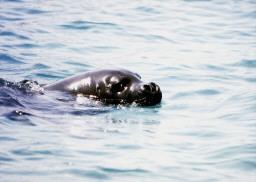One of Italy's top marine biologists has joined forces with a Greek organization that is working on a major new plan to rescue the nearly extinct Mediterranean monk seal.
Giuseppe Notarbartolo di Sciara is helping the Hellenic Society for the Study and Protection of the Monk Seal (MOm) to develop a national plan for Greece that could later be extended to Italy.
''The plan contains one aim, four objectives and a series of actions for the next five years,'' Notarbartolo di Sciara told ANSA.
''It has been designed for Greece, which is home to the largest population of this species, but the strategy is being drawn up in a way that would allow its export to all Mediterranean countries.
''If successful, Italy would see real benefits from the plan, encouraging the animals to return to the areas they have been driven away from''.
Mediterranean monk seals have not been a consistent presence in Italian waters since the 1980s although there was an extremely rare sighting of one animal off the Tuscan island of Giglio last week.
The International Union for the Conservation of Nature estimates their current global population is about 350-450 individual.
Most lives in Greece and Turkey, although around 150 are thought to inhabit the Atlantic coast of North Africa off Morocco, Madeira and Mauritania.
Greece plays a particularly important role in keeping the species alive as it is home to a breeding site where an estimated 30 pups are born each year.
''Breeding sites have vanished almost everywhere apart from Greece and Turkey and perhaps the northeast tip of Cyprus,'' explained Notarbartolo di Sciara.
''The individuals that are occasionally sighted here and there do not mean the Mediterranean monk seal is doing well.
The population is actually on the very brink of extinction''.
Notarbartolo di Sciara, who is honorary president of Italy's marine studies institute Tethys, said the Mediterranean monk seal was once a common sight in the waters of Liguria, Sardinia, Corsica, Gibraltar and the Balearic Islands.
The destruction of the seals' habitats and damage caused by fishing operations are the main reasons for the population's sharp decline.
Notarbartolo di Sciara said the central goal of the plan was to increase the number of Greece's Mediterranean monk seals and guarantee the survival and permanent settlement of seal populations.
This would take shape through four objectives, he said: declaring conservation to be a national priority; learning more about the species; taking concrete measures in sensitive areas by involving local residents; and adopting formal protection measures.
''We're still a long way from results but the Greek populations give all of us hope,'' he said.









